Alcohol-Related Deaths May Increase In The UK Due To Economic Changes, Cuts In Alcohol Taxation

The world’s alcohol problem is nothing new — 5.9 percent of global deaths were attributable to the psychoactive substance in 2012, translating to about 3.3 million people. In attempts to curb the harmful consequences of drinking, many countries have enacted measures to limit the amount of alcohol people consume. The most popular measure has been increasing alcohol taxes, which has proven effective both in reducing consumption and subsequent harm. In England, economic changes may cause incomes to outstrip rises in taxation, and experts are arguing these changes will most likely be associated with an increase in alcohol-related deaths.
While England faces this dilemma, alcohol-related deaths in Scotland will likely go down, the authors say, if economic laws regarding minimum-unit pricing for alcoholic drinks is implemented. Minimum-unit pricing is a policy targeted at problem drinkers, who consistently consume large quantities of the cheapest alcohol available. It simply sets a floor for alcohol pricing, meaning the substance cannot be sold for cheaper than a certain amount per unit.
An article by leading experts Nick Sheron and Ian Gilmore, of the University of Southampton and University of Liverpool, explains that if pending legislation in the UK passes, it could result in an “interesting and unusual situation.” Cheap alcohol will be restricted by minimum pricing in Scotland, which may be quickly followed by Ireland, North Ireland, and Wales.
The authors analyzed trends in the relationship between alcohol-related harm and changes in fiscal policy, which drives the alcohol marketplace. They say alcohol-related deaths are directly linked to the level of taxation; these deaths increased threefold between 1980 and 2008 in England and Wales, which they say was “probably driven by the increased affordability and availability of strong alcohol.”
Alcohol sales increased from 400 million liters in the early 1980s to 567 million liters by 2008 in the UK; during that time, alcohol-related deaths went from 2,314 to 7,312. The article reports that as wages increased and the government reduced alcohol taxes, it became possible to buy almost four bottles of vodka in 2008 for the price of one bottle in 1980. Four bottles per week is the average amount of alcohol a patient with alcohol-related liver cirrhosis consumes.
Alcohol-related deaths have fallen since 2008, most likely due to “economic factors affecting alcohol consumption of heavy drinkers — the recession and 2 percent duty escalator,” the authors wrote. A duty escalator insures that the tax rate on alcoholic drinks increases above the rate of inflation every year. When the 2 percent duty escalator was implemented in 2008, affordability of spirits fell by 50 percent, wine by 54 percent, and beer by 27 percent. Household incomes, meanwhile, fell by only about 9.5 percent.
Authors say the duty escalator had the greatest effect on deaths, but after a “fierce campaign of lobbying” by the Wine and Spirits Trade Association, the duty was dropped in 2014. Not only was the extra duty dropped, but duty for spirits and cheap cider was cut a further 2 percent, while incomes in England have begun to rise again. If the patterns under duty were allowed to continue, experts estimate there could be around 50,000 fewer deaths than expected.
Because the duty has been repealed, however, the authors predict a “relentless rise” in the number of alcohol deaths in England once more.
Source: Sheron N, Gilmore I. Effect of policy, economics, and the changing alcohol marketplace on alcohol related deaths in England and Wales. The BMJ. 2016.
Published by Medicaldaily.com



























